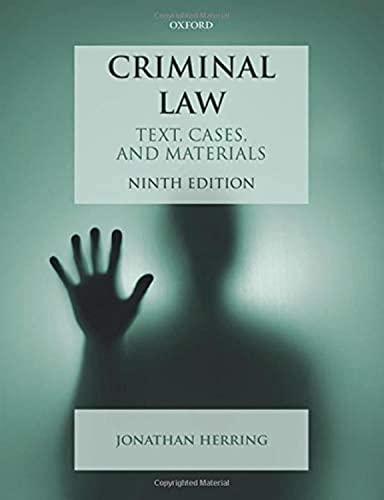Question
Taylor has lived in their apartment for 6 years, renewing the lease on an annual basis. On February 17th they notified their landlord that they
Taylor has lived in their apartment for 6 years, renewing the lease on an annual basis. On February 17th they notified their landlord that they accepted a new job in another state and would be moving out at the end of April. This notice was consistent with the terms of the lease which requires a 30-day notice to avoid penalties. Pursuant to the lease, the landlord was provided with a $900 security deposit to ensure that all terms of the lease were met and to cover any damages resulting from the Taylor's occupancy. On April 29th, Taylor emptied, cleaned, and vacated the premises, leaving the keys and their new address for the landlord in an envelope on the kitchen counter.
On May 14th and May 25th, Taylor left voicemails for the landlord, inquiring as to when they could expect to receive the return of their security deposit and received no response. On June 2nd, they were finally able to speak with the landlord directly and were informed that they would only be receiving a partial refund due to "the damage made to the apartment." When Taylor asked about the damages, the landlord told them that there were "a bunch of big holes in the walls" and that "the bathtub was all messed up." On June 7th, Taylor received a check from the landlord in the amount of $195.
Taylor believes that they should be entitled to a full refund of their security deposit, since they gave more than the required amount of notice that they were vacating the premises. Video recorded on the day they moved out shows only a cracked label on the hot water tap in the tub, which occurred prior to their tenancy, and holes in the walls no larger than what would be required to hang a medium-sized picture, or similar dcor.
Exercise 1
Directions: Enter the following citation into your search bar on Westlaw to retrieve and review the following article:
108 Causes of Action 2d 1
Using this source only, pleaseanswer the following questions.
1.What is the title of this article?
2.What general sections are listed under the Article Outline?
I:
II:
III:
IV:
V:
3.According to Section III (A) 20, actions to recover a security deposit will typically be brought in what type of court?
4.List the elements necessary to establish a prima facie case on Taylor's behalf as provided in Section II (A) 4 of the article.
5.Section II 's 8-10 list the type of violations relevant to Element 3 from Question 4 above. Please list those violations.
6.According to the Practice Guide notes for Section II (B) 14 what are the requirements that must be met for a repair cost to be properly deductible from the security deposit?
7.What section would be most helpful if you were asked to interview Taylor and begin the preliminary investigation for this matter? Why?
8.What section of this article would assist in preparing the initial pleading you would need to file and serve in order to commence litigation on Taylor's behalf? Explain your answer.
9.How might the article Index and/or Action Guide be useful in identifying additional search terms for further legal research?
10.Please discuss the information provided under Research References for this article.
Exercise 2
Please briefly discuss the Causes of Action article above as it relates to the first two levels oflegal researchas discussed on Pg. 515 ofStatsky.
Step by Step Solution
There are 3 Steps involved in it
Step: 1

Get Instant Access to Expert-Tailored Solutions
See step-by-step solutions with expert insights and AI powered tools for academic success
Step: 2

Step: 3

Ace Your Homework with AI
Get the answers you need in no time with our AI-driven, step-by-step assistance
Get Started


